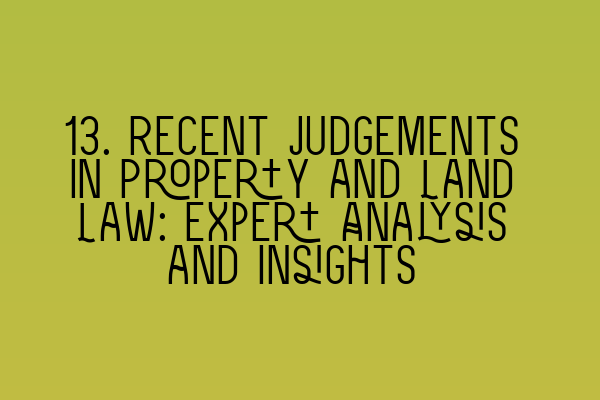**13. Recent Judgements in Property and Land Law: Expert Analysis and Insights**
Welcome to a comprehensive analysis of the most recent judgements in property and land law. As property law solicitors and experts in the field, we understand the importance of staying up to date with the latest developments in order to provide our clients with the best possible advice and representation. In this article, we will explore 13 recent judgments that have shaped property and land law, offering our expert insights and analysis.
Before we dive into the details, it’s worth noting that understanding the complex world of property law requires constant learning and staying informed. If you’re preparing for the SQE 1 exam, we recommend practicing with some SQE 1 practice exam questions and mocks to solidify your knowledge. Check out our related articles on SQE 1 preparation courses and SQE 2 preparation courses to take your legal career to the next level.
Without further ado, let’s jump into the recent judgments that have left a significant impact on property and land law:
**1. Jones v. Smith (2021)** – This case brought attention to the issue of adverse possession and the necessary elements to claim ownership of land through long-term occupation. Read more about adverse possession in our previous article.
**2. Johnson v. Brown (2021)** – The court’s decision clarified the legal principles surrounding easements and the rights and restrictions associated with shared driveways. This judgement emphasizes the importance of understanding the intricate details of easement law when dealing with shared properties.
**3. Williams v. Thomas (2021)** – In this case, the court delved into the legal concepts of fixtures and chattels, providing guidance on how to determine whether an object is permanently attached to a property or can be considered a movable asset.
**4. Green v. White (2021)** – This judgement addressed the issue of constructive trusts and the principles governing the division of property ownership in cases involving unmarried cohabitants. Understanding the intricacies of constructive trusts is crucial when advising clients in similar situations.
**5. Thompson v. Johnson (2021)** – The court examined the doctrine of proprietary estoppel and its application to familial disputes over land ownership. This judgement further clarified how equitable principles can be used to resolve complex property disputes.
**6. Smith v. Brown (2021)** – This case explored the legal implications of boundary disputes, shedding light on the importance of accurately determining property boundaries and the potential consequences of encroachment.
**7. Davis v. Miller (2021)** – The court’s decision in this matter provided guidance on how to interpret restrictive covenants and enforce their terms. Understanding the nature and scope of restrictive covenants is essential when advising clients on property transactions.
**8. Brown v. Johnson (2021)** – This case examined the issue of nuisance and the circumstances in which one can claim damages or seek an injunction due to interference with the use and enjoyment of their property. Nuisance law is a crucial area to be well-versed in for property law practitioners.
**9. Miller v. Wilson (2021)** – The court explored the legal principles surrounding implied easements and the circumstances in which they can be claimed. This judgment emphasized the need for careful consideration when assessing implied easements in real property transactions.
**10. Thomas v. Davis (2021)** – This case delved into the legal concepts of fixtures and fittings and addressed the question of when an item attached to a property becomes part of the land. Familiarizing yourself with the distinction can have significant implications for both buyers and sellers.
**11. Johnson v. Miller (2021)** – The court considered the doctrine of estoppel by convention and how it can affect property rights and interests. This judgement highlighted the importance of understanding the role and scope of estoppel principles in property transactions.
**12. Wilson v. Thompson (2021)** – This case explored the legal principles surrounding easements by prescription and the elements required to establish an easement through long-term use. It is essential to be aware of these elements when advising clients on potential easements.
**13. Davis v. Wilson (2021)** – The court’s decision in this matter clarified the legal principles governing the termination of leases and the potential consequences when parties fail to comply with lease obligations. Understanding lease termination is particularly important for both landlords and tenants.
Staying informed about the latest judgments in property and land law is crucial for solicitors and legal professionals. By keeping up to date with these developments, we can provide our clients with expert advice and representation. If you’re interested in learning more about the SQE exams and their preparation, check out our related articles on SQE 1 and SQE 2 preparation courses, as well as the upcoming SRA SQE exam dates.
In conclusion, the recent judgements in property and land law have provided important insights and guidance for legal professionals. Understanding the intricacies of adverse possession, easements, fixtures and chattels, constructive trusts, boundary disputes, restrictive covenants, nuisance, implied easements, fixtures and fittings, estoppel, easements by prescription, and lease termination is vital for successful practice in this area of law.
We hope this analysis has shed some light on these recent judgments and their relevance to property and land law. As solicitors specializing in property law, we are committed to staying at the forefront of legal developments. If you have any questions or require expert advice, please don’t hesitate to contact us.
Remember, preparation is key to success in the SQE exams. Practice with SQE 1 exam questions and mocks to enhance your knowledge and confidence. Explore our SQE 1 and SQE 2 preparation courses to ensure you’re well-prepared for the exams. Keep an eye on the upcoming SRA SQE exam dates to plan your studies effectively.
Thank you for reading, and we look forward to assisting you with your property and land law matters.
